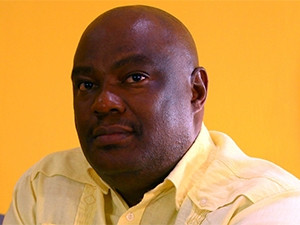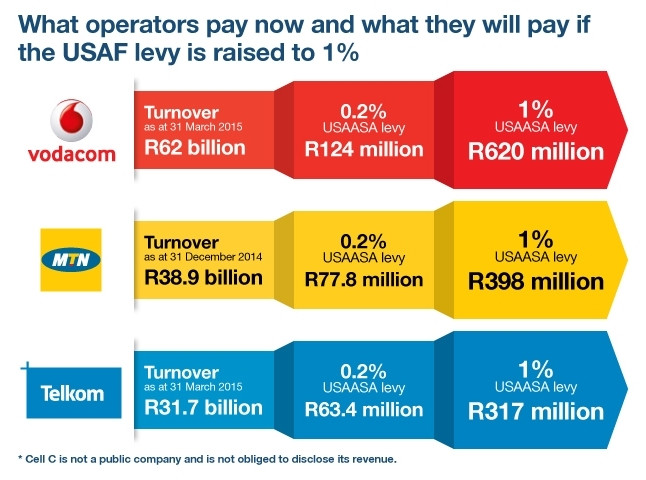
The Universal Service and Access Agency of SA (USAASA) wants at least R100 billion to close the ICT access gap in the country.
To raise the money, the agency has turned to its licensees, asking them to increase the levies they are paying to the Universal Service and Access Fund (USAF) from 0.2% to 1%.
However, mobile network providers, which are the biggest contributors to USAF, have raised concerns over the urged hike in the levies.
USAF was established under the Electronic Communications Act (ECA) to fund projects and programmes that strive to achieve universal service and access to ICT by all South African citizens.

Independent Communications Authority of SA (ICASA) spokesperson, Paseka Maleka, says under the ECA, every holder of a licence granted in terms of the Act must pay a levy not exceeding 1% of their annual turnover.
"ICASA is still in discussions with the relevant stakeholders, including but not limited to the Department of Telecommunications and Postal Services, as well as USAASA on this matter," Maleka adds.
In his budget speech last year, telecommunications and postal services minister Siyabonga Cwele said government would review the levy for USAF to align SA to the 1% charged by developing countries. It is hoped the minister will clarify this move during his departmental budget speech later this year.
Licence obligations
In a recent interview with ITWeb, USAASA CEO Zami Nkosi said for the agency to fully meet its mandate of delivering ICT to all South Africans, it must not only rely on funds from the treasury but licensees must pay 1% of their turnover to USAF.
"USAASA is supposed to get funding from network operators. At the moment, they are only contributing 0.2% of their turnover," Nkosi said. "That money is not sufficient to close access gaps. These are licence obligations that these companies are supposed to be paying. The ECA allows the agency to levy 1%."
According to Graham de Vries, corporate services executive at MTN SA, there is more than R2 billion in the USAF which has not yet fully been utilised.
"Instead of looking at increased contributions, the focus should first be on assessing and verifying the true extent of the universal service gap in underserviced areas and utilising the existing funds effectively to close this gap to benefit communities in underserviced areas," he points out.
However, USAASA's Nkosi refuted the claim, saying the national treasury's books indicate that at most R2 billion has been collected over the years, which is a drop in the ocean when one considers that the country needs R100 billion and more to close the ICT access gap.
The reality is that contributions have been on the decline while the gap either remained the same or worsened in some parts of the country, he says, adding the allocation the agency receives from the treasury has been dwindling over the years.
"That is cause for concern for us because you cannot expect a positive outlook to the country when there is no base infrastructure in place. It is pure basics of economics. The sooner we club together as a sector and drive ICT infrastructure together, the better off we'll be," Nkosi says.
Unnecessary levy
Graham Mackinnon, Cell C chief legal officer, notes Cell C continues to comply with the obligations associated to its licence conditions, including the rollout of connectivity to schools. However, he says this project has its own challenges, such as schools without electricity or those outside of Cell C's coverage area.
"Cell C will also continue its payments to USAF, although the company is concerned the collections are not being used for the purposes USAASA mandated it for. Cell C does not believe an increase in the levy is necessary or justified."
Jacqui O'Sullivan, Telkom's managing executive for group communications, says the increase to 1% will adversely affect licensees. It is likely to increase the levy by 400% over and above the various licence fees that operators pay and the universal service obligations they bear, she notes.
"Considering the fact that licensed operators are already contributing a substantial portion of their annual turnover to general licence fees, an estimated R100 million in Telkom's case, it seems quite cumbersome and, therefore, unjustifiable to expect licensed operators to contribute more than 0.2% to the USAF," says O'Sullivan.
She also points out that since 1997, the Universal Service Obligation regulatory framework has not been reviewed to align with the current market conditions.
"Telkom continues to carry the heavy financial burden of the 1997 PSTN [public switched telephone network] Licence Obligations, including additional universal access obligations like E-Rate. The net cost of providing obligations should be equitable across licensees, which should be based on globally acceptable principles, a comprehensive cost-benefit analysis, and principles of promotion of competition, transparency and non-discrimination," says O'Sullivan.
She adds Telkom would also go as far as suggesting licensed operators be allowed to design ways of utilising their USAF contributions in more efficient methods of achieving universal service and access in SA.
Share